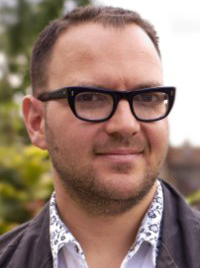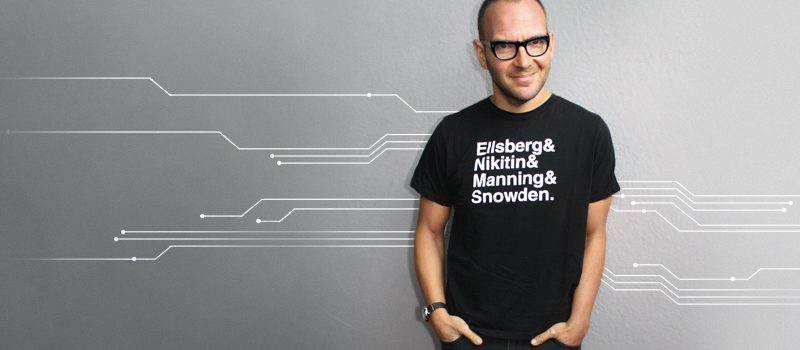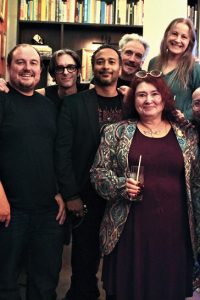Cory Doctorow: How to Do Everything (Lifehacking Considered Harmful)

I was there when “lifehacking” was born. It was the 11th of February, 2004, at the O’Reilly Emerging Technology Conference, held in a giant conference hotel in San Diego. I was on the committee for ETech (as we called it) and I had lobbied hard for the inclusion of a talk called “Life Hacks: Tech Secrets of Overprolific Alpha Geeks” by Danny O’Brien, a technology columnist and former standup comedian who is also a good friend (I am now godfather to his daughter, Ada). I’d watched Danny compiling his research for the talk and I knew it would be a great one.
I liveblogged his presentation, because this was before lifehacking, but after liveblogging (if only barely). Danny described a research project in which he interviewed “overprolific” tech workers who had a reputation for doing a lot of things at once, and reported on their commonalities. My notes on the talk are still live at <www.craphound.com/lifehacksetcon04.txt>, but the long and short of them was that all of these super-nerds were really good at one or two flexible tools (ranging from Excel spreadsheets to the programming language Python), and they used those tools to automate many of the processes in their life. They also all used some kind of master, monster to-do list and file-of-useful-pasted-snippets.
I recognized some of my own working habits in the description, and, more importantly, acquired some useful tips. After all, I was one of those really techie people who did a lot of different things at the same time: writing novels, working for an activist group, editing a blog, sometimes even having a life. One intriguing takeaway from the talk was a recommendation to read David Allen’s 2001 book Getting Things Done, an instant classic in the “personal productivity” genre (this was after the productivity genre, but still before lifehacking).
Allen’s book is a fantastic and inspiring read. The core of his philosophy is to recognize that there are more things in the world that you want to do than you could do, and that, in the absence of a deliberate approach to this conundrum, you are likely to default to doing things that are easy to scratch off your to-do list, which are also the most trivial. After a lifetime of this, you’ll have accomplished a lot of very little.
Allen counsels deliberate, mindful prioritization of this list, jettisoning things on the basis that they are less satisfying or important than the other things you’d like to do – even if those other things are harder, more time consuming and less likely to result in a satisfying chance to scratch an item off the list.
This resonated with me and, by 2004, I’d bought and given away half a dozen copies of Getting Things Done and put its method in place. I even had a chance to sit down with Allen in 2007 and talk about how the web fit into his method.
It’s been more than a decade since I took up Allen’s method and started lifehacking (as the kids say), and I have a report from the field.
The past 14 years have regularly featured junctures where I had to get rid of something I liked doing so I could do something I liked doing more. Some of that was low-hanging fruit (I haven’t watched TV regularly in more than a decade), but after getting rid of the empty calories in my activity diet, I had to start making hard choices.
In retrospect, I observe that the biggest predictor of whether an activity surviving winnowing is whether it paid off in two or more of the aspects of my life and career. If something made me a better blogger – but not a better novelist and activist – it went. The more parts of my life were implicated in an activity, the more likely I was to keep the activity in my daily round.
Some of these choices were tough. I have all but given up on re-reading books, despite the undeniable pleasure and value to understanding the authors’ craft, which is easier to unpick on subsequent readings. But I have more than 20 linear feet of books I’ve promised to read for blurbs and reviews, and reading those books also teaches me something about the craft, also brings me pleasure, also makes me a better reviewer, and also makes me a better citizen of science fiction, who contributes to the success of worthy new books.
Some social media tools – like Facebook – make for fun (if problematic) socializing, and all social media pays some dividend to authors who are hoping to sell books and activists who are hoping to win support, but Twitter also teaches me to be a better writer by making me think about brevity and sentence structure in very rigorous ways (and from an activist perspective, Twitter is a better choice because it, unlike Facebook, doesn’t want the web to die and be replaced by its walled garden) – so Twitter is in, and Facebook is out.
There are some unexpected outcomes from this process, albeit ones that are obvious in hindsight.
The first is that it has gotten progressively harder to tease apart the different kinds of work I do. People often ask, “How much of your day do you spend writing, and how much being an activist, and how much on journalism?” The answer has always been that it’s hard to cleanly separate these activities, because they overlap – writing a blog post is a way to think through and track an idea that might show up in a story, and also a way to raise alarm at a political affair.
But today, thanks to a vicious Darwinian winnowing process, the only activities left in my day serve double- and triple-duty. There is virtually no moment in my working day that can cleanly be billed to only one ledger.
The corollary of this is that it gets much, much harder to winnow out activities over time. Anything I remove from the Jenga stack of my day disturbs the whole tower.
And that means that undertaking new things, speculative things that have no proven value to any of the domains where I work (let alone all of them) has gotten progressively harder, even as I’ve grown more productive. Optimization is a form of calcification.
That presents a paradox: if the purpose of lifehacking is to mindfully choose your priorities, what can you do when that process leads you to a position where no more choices are possible?
I’ll let you know if I figure it out. In the meantime, let this be a warning to anyone who wants to do it all.
Cory Doctorow is the author of Walkaway, Little Brother, and Information Doesn’t Want to Be Free (among many others); he is the co-owner of Boing Boing, a special consultant to the Electronic Frontier Foundation, a visiting professor of Computer Science at the Open University and an MIT Media Lab Research Affiliate.
This review and more like it in the November 2017 issue of Locus.









Next move: remove an activity from the Jenga stack of your day, bring the whole tower down, and rebuild with new activities and projects
Agreed. If Corey is still looking for areas to optimize, it looks like his goal of multi-duties tasks are not making him happy. As I’ve reached major milestones in my life, I’ve stopped doing GTD and put them on autopilot. This created the unstructured time to find the next milestone. I’m not the same person I was ten or five years ago, and I hope I’m not the same person five years from now.
Let the system fail and find out what is important to you. I hope you have better luck, as it took being downsized and a serious family illness to make my systems fail.
Very interesting Cory. Everything you do is a SOMETHING related to SOMETHING. This can lead to a very ground-level perspective on life, no matter how smart or well-intentioned you are. You need to take some time off (hopefully this is doable for you, from a financial perspective) from doing THINGS, so you can just BE. Existence (and by existence I mean physical reality itself, and our perception of it) (which are functionally the same) can be thought of as a rat-maze of THINGS relating to THINGS. You need to relax and rise above the maze so you can see the whole thing, rather than be enmeshed and imprisoned eyeball-deep in this maze. I’m not sure what your drug habits are, but I highly recommend the regular recreational (and I do mean re-creation-al) use of marijuana as a gentle, natural way of shaking off habitual patterns and lightening your viewpoint up. There are higher realms of perception and being, spiritual levels of being that can only be accessed by getting the minutiae of Work (no matter how important and compelling the work might be) and News and Incident and Relation out of the way. Life hacking turns your entire existence into a tech-app, a piece of capitalist tech, meant only for getting more done as efficiently as possible. That’s fine as far as it goes, but one’s soul cries out for there to be more to life. In addition to the SOMETHING side of life, there is the NO-THING side. One’s life can and should be fed from both sides.
I thought you were going to recommend something like taking several months off to hike the entire Appalachian trail. But your recommendation is to use marijuana? Please.
Totally agree with you Andy, great comment. Expansion of consciousness will lead you to better living. And yes, marijuana do help a lot. Just do you a serious paper research and you will see it.
The conundrum reminds me of when you have a software project which at some point needs to be completely re-coded from scratch in order to move forward. Also, it reminds me of Richard Hamming’s talk “You and your Research”, specifically in th question and answer section, when he said “Somewhere around every seven years make a significant, if not complete, shift in your field […..] because you tend to use up your ideas. When you go to a new field, you have to start over as a baby.”
At (perhaps) unevenly spaced times, a turn appears in the road; take it.
Shake up the box of ‘stuff’ we carry with us everywhere, let it scrape off some of the moss lining the quiet box, and see what turns up when next we open it.
Another important metaphysical lesson it took me a while to see; whatever keeps popping up in your face (make that in your life) over and over, that you didn’t deal with the first time, well, THAT is what you’re working on. If you don’t solve that puzzle this time, that’s OK, now you know it’ll be back. Maybe you’ll catch it next time.
If the cannabis (or any other adjutative) takes your head somewhere, be sure to look back from there, and see what the perspective is.
Very interesting thoughts, Cory. I have done what may be the very opposite. More than fifty years ago, when I was a kid in high school my fellow science-nerd friends and I were talking about search algorithms and their application to learning. One of the things that greatly impressed me, and I subsequently adopted as a life-strategy was a random approach to learning. The idea was that I wouldn’t filter what I learned on the basis of my interests or what I’d previously learned.
Of course, in the purest form this is impossible, but over time I became very good at taking in any information and considering it without bias. I ignored the standard way of doing things and let myself approach a topic from any angle. It meant that my knowledge often had holes in it that the “standard” way of learning assumed were required, but it meant I trod the never-taken path, often connected together information that others never would, and developed an unusually broad background of knowledge.
Unfortunately it also meant that it enhanced my distractedness — already a very strong personal trait — and prevented me from becoming an expert in any one thing. In many respects I could be considered a “failure”. However, despite living below the poverty line, I am happier than anybody I’ve met, and all the people around me turn to me for knowledge on dozens of topics. I can relax and sleep any time, anywhere, and am never bored because there is always something interesting to hand. I’ve never stopped learning.
Recently, conscious of time running out, I began trying to refocus my life. Given the habits of a lifetime it is unbelievably difficult to do — almost painful — but has brought some dividends: some science fiction novels written (free on my website http://miriam-english.org ), and some computing expertise.
My advice to you would be to allow in some randomness (though I don’t advise taking it as ridiculously far as I did). Allow yourself to be surprised and charmed by anything that crosses your path. That doesn’t mean discarding your critical faculties though — it is always important to judge information for truth or falsehood. A random approach probably makes that even more important than ever.
I’d advise the opposite to Andy above on the topic of drug use. We humans are all more or less insane anyway; use of any drug that distorts the perceptual filters makes it even more difficult to evaluate reality. But worse is the rebound effect that people commonly fail to account for — many drugs, including cannabis, can be relaxing, but people don’t notice how the aftermath of use unbalances the mind’s emotional levers. New knowledge is such a great high anyway — better than any drug.
Most importantly, I wouldn’t worry too much about the path you’ve taken. It obviously works well for you. Perhaps some minor tweaks might benefit you, but on the whole, please keep doing what you do.
You need an hour of nonsense. One hour devoted to random ideas, or activities. No filling it with work or play or your normal stuff. Devote it. Every day, three times a week, whatever works.
That will really mess you up when you find some new love.
What you are describing is exactly, what the programmers of heuristic optimization algorithms call a local optimum.
The usual solution is always applying a little random motion, so you don’t get stuck there. (the exact dosage is always debatable) You will move away from your local optimum in search of another, that is hopefully (but not guaranteed) closer to the global optimum. Off cause in computer science the cost of this is just processing time and not life time…
But you could try scheduling a little time slot each week to an interesting activity of untested utility until you can decide if it’s better than something you have in your fixed set, and then trying the next thing.
Since you have some knowledge of the problem domain, you can use that to make better than totally random choices.
Applying the motto “Everything in moderation, including moderation.” (²) to lifehacking solves this issue: There has to be some time left to be foolish.
—
(²) by Oscar Wilde, Horace Porter, or Petronius
Reading your words feels like you are asking which lens prescription you should be working with, but more metaphorically how will the priority of your curation will effect your short term, longer term and lasting legacy.
If you are wearing a prescription that is nearsighted, vs far sighted, the decision tree topology looks profoundly different regardless of whether you take time off or do not, take drugs or do not, or invite new elements of random.
How you process and load your perception, what you want to deliver for yourself, your family and your legacy is still really quite within your reach to manipulate with few other changes.
Keep fighting the good fight, which is of course, making the right choice for Cory.
Seems to me that you need some deliberately non-optimized time. A half day (or more) where you don’t have any rules or double/triple dipping tasks but just go do something fun and different from your usual mix.
Take a walk – if something catches your eye stop and change your plans.
Or go reread an old favorite book – the stack of books to be reviewed will still be there tomorrow
Or play a game (for me running RPGs is my mental break from startups and parenthood)
I’ve run into a similar issue.
I love locks. I’m a locksmith. It works well for me, unlike being a corporate drone in a big aerospace company. And I teach lock picking, and am in demand for it. So I get to go to all sorts of cool events and conferences – but mostly all I get to do is locks.
Like, I imagine, any broad skilled genius known for a single topic, I get requests 99% of the time on that “chosen specialist subject”. Which means I stop learning, as I am always the teacher.
This, I recently took a conscious decision to change. Because you only get one life. I love creating and learning, and though I’m an excellent teacher, it isn’t my passion.
Hmm. Want expecting my photo to appear there. Ah well. So much for being slightly anonymous!
Problem is, I’m English, so that now feels far too boastful…
Looks like you fell into the pit of lifehacking your whole life. Allen should maybe have stated that a person needs to leave room for randomness and chaos. For me that’s 3 out of 4 days. But I think that can differ. 😀
Ha ha
Become a boxer?
Or a chandler
A couple of people already recommended “an hour of adventure” to bring some randomness. That may feel disconnected, lonely, and irrelevant – like falling off that Jenga tower and thrashing in the void.
How about an hour of following a friend’s interest? The minimal viable relevance is learning about our friends. More often than not, because we know one another well enough, the friends can help build relevant connections, bridges from my Jenga tower to theirs, as it were. That feels powerful: highly novel yet highly relevant.
I’ve been reading BoingBoing for many years, and I am pretty sure you already have a practice like that somewhere in your system, Cory.
I have personally always felt when I reached that point that it was an error in the code. Time to topple the Jenga tower and rebuild. A good amount of chaos peppered into an otherwise well optimized life can be a fantastic opportunity.